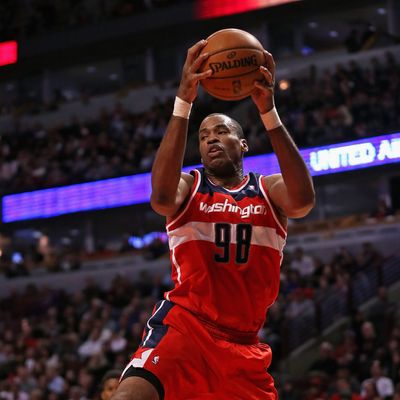
When veteran NBA center Jason Collins came out as gay in a Sports Illustrated cover story this morning, he made history and opened doors for the next generation of athletes, but also for himself. In a moving essay, Collins stressed his reputation in the league as a bruiser and a journeyman, but before today, his name-recognition as a player was low — he’s averaged just 3.6 points a game in twenty minutes over twelve seasons. Now, as the first active male professional athlete in a major team sport to identify openly as gay, Collins instantly becomes an in-demand spokesman with potential as an author and on the speaking circuit.
“He would hardly have been guaranteed a job next year, regardless of his sexual orientation,” wrote Nate Silver of the 34-year-old free agent. But however the announcement affects the rest of his career as a player, he now has other options.
“This was, to some extent, preplanned,” said Jason Pinter, a best-selling author and publishing insider, who works as the senior marketing manager for Grove/Atlantic and Mysterious Press. Although Pinter has no direct knowledge of Collins’s dealings, he inferred, “He didn’t wake up this morning and tweet it out. It wasn’t a decision made without any ancillary benefits in mind. He’s aware of the fact that he might not get re-signed. He’s certainly setting himself up to be a great member of the community. This could give him a bit of a post-NBA career. And a noble one.”
The first, and most obvious, option is a book. “The closest comparison is John Amaechi,” the former NBA player who came out after retirement and wrote a memoir, Man in the Middle, said Pinter. “But from a business perspective, that book underperformed, even with a ton of publicity. That’s a bit of a red flag from a commercial sales standpoint.”
“The only way a large advance could be justified [for Collins] is if it became an NBA or sports tell-all and named names in a not-so-positive light,” he said. “He doesn’t seem like he wants to dish dirt and potentially wreck lives and careers. If he were to do something more motivational than straight-up memoir, like a self-help book with speaking tours, that could be a little more timeless, instead of rehashing a story that, by the time a book comes out, people will have read. A [motivational book] would have a longer shelf life and could easily get a six-figure-plus advance.”
“Within about ten minutes [of the Sports Illustrated story] there were tweets flying around amongst people in the book trade,” another publishing expert told Daily Intelligencer. “The piece was very well written. He has an eloquent voice and an amazing platform. It makes him a compelling potential author. But the key is speed. The interest is already pretty high, and the money will certainly be healthy. I fully expect one publisher, at least, to want to overpay.”
“Collins didn’t do this to make a political statement, much less to satisfy a sponsor,” insisted Jon Wertheim. Still, representatives for Collins approached Sports Illustrated about a potential story, and enlisted the co-writer Franz Lidz, knowing how big of a deal it would be, as well as what the timing meant, both with regard to the turning tide of gay rights across the country and Collins’s future.
“Loyalty to my team is the real reason I didn’t come out sooner,” Collins wrote. “I was ready to open up to the press, but I had to wait until the season was over.” When it was time, he had a powerful support system ready, including his former roommate at Stanford, congressman Joe Kennedy, and “speed-dial friends Bill Clinton and Condoleezza Rice, to name two,” according to SI. Chelsea Clinton, another Stanford classmate, and Valerie Jarrett both tweeted words of encouragement. (Collins, meanwhile, gained more than 40,000 followers.)
“I’ve never sought the spotlight,” said Collins in his story, knowing it was inevitable. “Though I’m coming out to the world, I intend to guard my privacy.” But that doesn’t mean there isn’t more of his story worth sharing, especially if the demand is there when he’s no longer a presence on the court, but still shy of 40 years old.
“He’ll definitely be a hot commodity,” said David Lavin, founder of the Lavin Agency Speakers Bureau. “Automatically.”
“My recommendation would be that he should have two-tiered fees: one for college groups and one for corporate groups,” said Lavin. “There are a lot of organizations that find this issue important.” Collins, he estimated, could command between $10,000 and $50,000 per appearance.
“10k an hour adds up,” he added. “It’s not as good as playing in the NBA, but it’s not bad.”





























